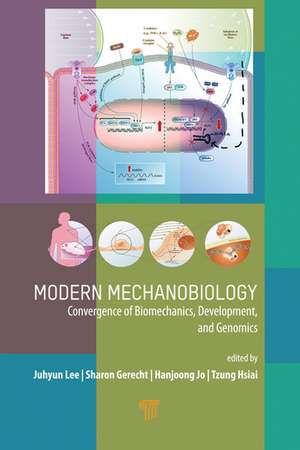Modern Mechanobiology: Convergence of Biomechanics, Development, and Genomics
Editat de Juhyun Lee, Sharon Gerecht, Hanjoong Jo, Tzung Hsiaien Limba Engleză Hardback – 25 feb 2021
Preț: 843.83 lei
Preț vechi: 1029.06 lei
-18% Nou
Puncte Express: 1266
Preț estimativ în valută:
161.52€ • 175.50$ • 135.76£
161.52€ • 175.50$ • 135.76£
Carte tipărită la comandă
Livrare economică 21 aprilie-05 mai
Preluare comenzi: 021 569.72.76
Specificații
ISBN-13: 9789814800587
ISBN-10: 9814800589
Pagini: 262
Ilustrații: 60
Dimensiuni: 152 x 229 x 16 mm
Greutate: 0.66 kg
Ediția:1
Editura: Jenny Stanford Publishing
Colecția Jenny Stanford Publishing
ISBN-10: 9814800589
Pagini: 262
Ilustrații: 60
Dimensiuni: 152 x 229 x 16 mm
Greutate: 0.66 kg
Ediția:1
Editura: Jenny Stanford Publishing
Colecția Jenny Stanford Publishing
Public țintă
Academic and Professional Practice & DevelopmentCuprins
1. Shear Stress, Mechanosensors, and Atherosclerosis 2. Role of Krüppel-Like Factors in Endothelial Cell Function and Shear Stress–Mediated Vasoprotection 3. Aortic Valve Endothelium Mechanobiology 4. Mechanotransduction of Cardiovascular Development and Regeneration 5. Mechanotransduction in Heart Formation: An Avian Model for Regulating Hemodynamics 6. Mechanotransduction in Cardiovascular Development and Regeneration: A Zebrafish Model for Genetic Manipulation 7. Mechanosensitive microRNAs in Health and Disease 8. Mechanotransduction to the Cell Nucleus 9. Computation of Congenital Heart Disease: A Sheep Model 10. Integrating Light-Sheet Imaging and Shear Stress–Mediated Notch Signaling to Elucidate Cardiac Trabeculation for Contractile Function
Notă biografică
Juhyun Lee is assistant professor of bioengineering at the University of Texas at Arlington. He completed his BS, MS, and PhD in biomedical engineering from the University of Utah, the University of Southern California, and the University of California, Los Angeles, respectively. He also studied cardiac chamber development in response to biomechanical forces. Dr. Lee has published more than 49 peer-reviewed articles. Over the past few years, he has focused on novel optical systems design, and cardiac development and regeneration.
Sharon Gerecht is professor of chemical and biomolecular engineering and director of the Johns Hopkins Institute for NanoBioTechnology, Maryland, USA. Her research group studies the interactions between stem cells and their microenvironments. She has authored more than 150 papers, book chapters, and patents in her field. Dr. Gerecht is an elected fellow of the American Institute for Medical and Biological Engineering (2016) and an elected member of the National Academy of Medicine (2019).
Hanjoong Jo is John and Jan Portman Professor and Associate Chair in the Coulter Department of Biomedical Engineering (BME) at Emory University, Georgia, USA, and Georgia Tech and Professor of Medicine at Emory University. He directs the Cardiovascular Mechanobiology and Nanomedicine lab, which studies how genes in blood vessel cells and cardiovascular diseases are regulated by blood flow, develops novel therapeutics by targeting flow-sensitive genes, and develops nanotechnology for safe and effective treatment of cardiovascular diseases. Dr. Jo has published 180 peer-reviewed papers and edited two books. He is an elected fellow of the Biomedical Engineering Society, American Institute of Medical and Biological Engineering, American Heart Association (AHA), and American Physiological Society. He currently serves on the board of directors of BME Society.
Tzung K. Hsiai is Maud Cady Guthman Endowed Chair in Cardiology and professor of medicine and bioengineering at the UCLA Cardiovascular Engineering & Light-Sheet Imaging Laboratory, Los Angeles. He graduated from Columbia University and received his medical training from the University of Chicago. He completed his internship, residency, and NIH-funded cardiovascular fellowship at the UCLA School of Engineering and Medicine, Los Angeles, where he developed microsensors to study mechanotransduction underlying vascular injury and repair. His group was instrumental in the development of the LA PRISM Program between UCLA Bioinformatics and USC Environmental Health. Dr. Hsiai is the founding director of UCLA/Caltech Training Programs for Cardiovascular Bioengineers and has received several awards, including the AHA John J. Simpson Outstanding Research Achievement Award.
Sharon Gerecht is professor of chemical and biomolecular engineering and director of the Johns Hopkins Institute for NanoBioTechnology, Maryland, USA. Her research group studies the interactions between stem cells and their microenvironments. She has authored more than 150 papers, book chapters, and patents in her field. Dr. Gerecht is an elected fellow of the American Institute for Medical and Biological Engineering (2016) and an elected member of the National Academy of Medicine (2019).
Hanjoong Jo is John and Jan Portman Professor and Associate Chair in the Coulter Department of Biomedical Engineering (BME) at Emory University, Georgia, USA, and Georgia Tech and Professor of Medicine at Emory University. He directs the Cardiovascular Mechanobiology and Nanomedicine lab, which studies how genes in blood vessel cells and cardiovascular diseases are regulated by blood flow, develops novel therapeutics by targeting flow-sensitive genes, and develops nanotechnology for safe and effective treatment of cardiovascular diseases. Dr. Jo has published 180 peer-reviewed papers and edited two books. He is an elected fellow of the Biomedical Engineering Society, American Institute of Medical and Biological Engineering, American Heart Association (AHA), and American Physiological Society. He currently serves on the board of directors of BME Society.
Tzung K. Hsiai is Maud Cady Guthman Endowed Chair in Cardiology and professor of medicine and bioengineering at the UCLA Cardiovascular Engineering & Light-Sheet Imaging Laboratory, Los Angeles. He graduated from Columbia University and received his medical training from the University of Chicago. He completed his internship, residency, and NIH-funded cardiovascular fellowship at the UCLA School of Engineering and Medicine, Los Angeles, where he developed microsensors to study mechanotransduction underlying vascular injury and repair. His group was instrumental in the development of the LA PRISM Program between UCLA Bioinformatics and USC Environmental Health. Dr. Hsiai is the founding director of UCLA/Caltech Training Programs for Cardiovascular Bioengineers and has received several awards, including the AHA John J. Simpson Outstanding Research Achievement Award.
Descriere
Modern mechanobiology converges both engineering and medicine to address personalized medicine. This book is built on the previously well-received edition, Hemodynamics and Mechanobiology of Endothelium. The central theme focuses on “omic” approaches to mechanosignal transduction underlying tissue development, injury, and repair.
